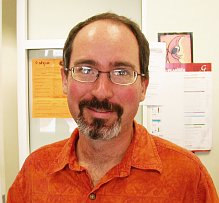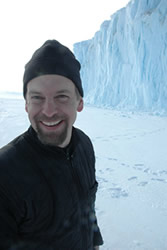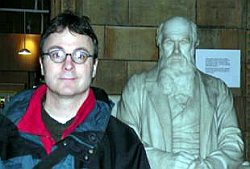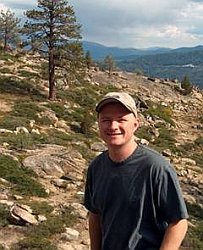
Contents
Experiences in Integrative and Comparative Biology
Al Bennett and Edwin Cooper
Message from the President
John Pearse
Message from the Treasurer
Ron Dimock
Message from the Program Officer
Eduardo Rosa-Molinar
Message from the Past Program Officer
Linda Walters
Message from the Secretary
Lou Burnett
Divisional Newsletters
Comparative Biomechanics (DCB)
Comparative Endocrinology (DCE)
Comparative Physiology and Biochemistry (DCPB)
Developmental and Cell Biology (DDCB)
Evolutionary Developmental Biology (DEDB)
Division of Ecology & Evolution (DEE): 2008 Spring Newsletter
In this newsletter:
Message from the Chair George Bakken, Program Officer Mike O'Connor, and Secretary Michael Finkler
Greetings from the DEE officers. San Antonio was a great meeting, and we would like to thank everyone who helped to make it so. DEE co-sponsored four symposia and by all accounts these were very successful.
We are looking forward to an exciting meeting in Boston next January, where DEE is co-sponsoring four symposia:
The Biology of the Parasitic Crustacean
Genomics and Vertebrate Adaptive Radiation: A Celebration of the First Cichlid Genome
Cell-Cell Signaling Drives the Evolution of Complex Traits
PharmEcology Symposium: A pharmacological approach to understanding plant-herbivore interactions
The DEE webpage is still featuring the research of its division members. Please check out the site at http://sicb.org/divisions/dee.php3. If you would like to contribute material to the site please submit text files as either Word or text documents, images as either .tif, .jpg, .png, or .gif, and movies as .avi or .mpeg, to Michael Finkler (mfinkler@iuk.edu) or George Bakken (gbakken@indstate.edu ).
This year we had 48 students participate in the DEE Best Student Presentation Competition, with 30 talks and 18 posters entered into the competition. The Best Student Paper Award went to Phillip Bergman for his talk "Conservatism in lizard vertebral number evolution is widespread but not universal," and the Best Student Poster Award went to Allison Churcher for her poster entitled "In search of the sea urchin nose: The molecular basis for chemoreception in S. purpuratus." We congratulate the winners and all the students who participated in the competition for the high caliber work that was presented. We would like to thank the following DEE members who graciously volunteered their time at the meeting to serve as judges for the best student paper competitions: Roger Anderson, Ken Angielczyk, Audrey Aronowsky. Sarah Berke, Wendy Binder, Isabelle-Anne Bisson, Jean Block, Patrice Boily, Mark Botton, Robert Cox, Dan Hahn, Meg Hall, Roi Holzman, John Hranitz, Molly Jacobs, Jennifer Jost, Misha Matz, Chas Peterson, Christoph Schubart, and Pete Zani. Judging student papers is a great way to support DEE. If you didn't volunteer this year - please consider volunteering your time in Boston. We will be forwarding a more formal request for judges in the fall.
Attendance at the San Antonio DEE business meeting was extremely low compared to the number of DEE members. We would appreciate your input on how we might make the division more relevant to your interests and/or make it easier for you to attend the business meeting.
We currently have two business items to deal with before the next meeting.
Our bylaws need to be revised to bring them into line with the Society generally and with some proposed changes regarding officer terms and the creation of two new positions (secretary-elect and program officer-elect). These are items we will consider in the fall and will be detailed in the fall newsletter.
Election of Chair-Elect and Program Officer.
Elections: Candidates for Chair-Elect and Program Officer
Candidates for Chair Elect
Chris Tracy
Current Position: 2005-present, Research faculty, Charles Darwin University, Darwin, Australia
Education: B.S. (Zoology), Colorado State University, 1992; M.S. (Zoology), University of Oklahoma, 1995; Ph.D. (Zoology), University of Wisconsin, 2002
Professional Experience: 2005- present, Research faculty, Charles Darwin University; 2004-2005, Postdoctoral fellow, Mitrani Department of Desert Ecology, Jacob Blaustein Institutes for Desert Research, Ben-Gurion University of the Negev; 2002-2005, NSF International Postdoctoral Fellow, hosted by Dr. Keith Christian at Charles Darwin University; 1995-2002
SICB Activities: Member since 2000
Other Memberships: American Society of Naturalists, Ecological Society of America, American Society of Ichthyologists and Herpetologists, Herpetologists’ League, Society for the Study of Amphibians and Reptiles
Research Interests: My primary interests are in physiological, biophysical, and evolutionary ecology of reptiles and amphibians. My research projects cover a broad range of physiological ecology linked by a theme of learning how individuals interact with their environment to exploit physiological opportunities, and to meet the physiological challenges of local and global environments. This information forms the basis for answering ecological and evolutionary questions about population or species characteristics. One focus of my research is in the interconnected processes of thermoregulation and hydroregulation in amphibians. Australian tree frog species differ greatly in their ability to resist water loss, so they make an excellent model group for studying the relationships between water and temperature balance in amphibian. Understanding these autecological interactions has allowed me to explore questions about patterns of habitat use (terrestrial, arboreal, or aquatic habitat use) among species in the tree frog family. A second focus of my research has been on autecological interactions that drive the evolution of patterns of variation in reptile life history, body size, and body shape in a desert lizard (the chuckwalla) as a model species.
Goals Statement: I believe that the importance and strength of the DEE, and generally of SICB, is that the Division actively encourages interaction among the many subdisciplines used by researchers to understand the ecological an evolutionary relationships among organisms. This is reflected in the purpose of the DEE "... to advance, coordinate, and assist research and publication of knowledge regarding the ecological and evolutionary relations of organisms, and to act as a liaison agency between investigators in the several scientific disciplines involved." Thus, one of my goals as Chair of DEE would be to promote the exchange of information to and among members. I see important initiatives in this area including, encouraging and promoting of interdisciplinary symposia at the annual meetings, and expanding the information available on the Division website to make it a central hub for exchange of information about the research interests of members as well as Society or Division news and information. The DEE website also represents an opportunity to promote science in general, and ecology & evolution in particular, to the general public and such opportunities seem increasingly important with the current atmosphere of skepticism toward ecological and evolutionary sciences. My hope would be to attract interest of others to help us make our website outstanding and helpful to our members.
Because the future strength of the DEE and SICB depends on continued recruitment of young biologists who represent a diversity of interests and backgrounds, another of my goals as DEE Chair would be to extend the Society’s laudable history of strong support of its younger members. This would include encouraging underrepresented groups as well as international members to join and participate in our meetings, and to promote opportunities for younger members to take an active role in directing the society.
H. Arthur Woods
Current Position: Assistant Professor of Biology, University of Montana, Missoula, MT
Education: B.S., Stanford University 1991; PhD University of Washington, 1998
Professional Experience: Postdoctoral Fellow, Arizona State University (1998 - 2001), Lecturer & Research Scientist, University of Texas at Austin (2001 - 2006), Assistant Professor, University of Montana (2006 - present)
SICB Activities: member since 1993, SICB poster judge for most years after 2000.
Research Interests: I am broadly interested in the physiological ecology of insects and marine invertebrates. My research projects focus on physiological responses to abiotic factors, especially temperature, water, and oxygen. Although the field of physiological ecology has deep roots, its goals, questions, and techniques have undergone radical change in the past 15 years. From my perspective, the two most important conceptual advances have been a much stronger integration of evolutionary processes and a better understanding of how different physiological systems interact across spatial and temporal scales. Technically, better and cheaper tools have allowed us to observe processes that simply weren't visible 10 years ago. Currently I am pursuing two projects. The first is an examination of the physiological ecology of plant-insect interactions from the perspective of insect eggs. Leaf-associated eggs live in boundary layers that are profoundly influenced by leaf morphology and physiology. My project seeks to understand how variation in egg experience is partitioned among different geographic and biological levels and how that variation affects egg physiology and fitness. A second project, in collaboration with Amy Moran, examines the evolutionary physiology of oxygen biology in marine-invertebrate egg masses. We're interested in how latitudinal variation in sea temperature and oxygen availability has influenced the evolution of egg masses of nudibranchs. So far, we've been to a very cold place (McMurdo Sound) and a somewhat cold place (Friday Harbor) to study egg masses. In an ideal world, we will also visit a very warm place (e.g., Solomon Islands), though no funding for the warm leg has yet been procured.
Goals Statement: Like many of you, I have grown up intellectually at SICB. The meeting welcomes young scientists into a stimulating, friendly atmosphere. Although substantial mechanisms for supporting students already exist, I will work to increase both the funds available to cover student travel and meeting costs and the visibility and organization of DEE-student interactions. I applaud the suggestion outlined in the last DEE minutes to raise the visibility of the student poster competition, and I will work to make this so. For more established SICB scientists, another possibility would be to institute a high-profile talk, akin to DCPB's Bartholomew Award, but aimed more directly at those working in ecology and evolution. Such a move would have to be approached cautiously, as we wouldn't want to step on Bartholomew's toes or saturate the meeting with too many plenary talks. However, such an award could provide a venue for very interesting talks. Finally, I will work to organize more and better DEE socials. Many of my most memorable and productive conversations at SICB occurred while playing hooky from the talks to chat with other scientists. Scheduling 'unscheduled time' may help new or shy recruits start to make those connections themselves.
Candidates for Program Officer
Dale D. Edwards
Current position: Professor of Biology, University of Evansville
Educational Background: B.S., Brandon University, 1986; M.S., Wake Forest University, 1988; Ph.D., Wake Forest University, 1993
Professional Experience: Visiting lecturer, High Point University, 1993; Visiting Assistant Professor of Biology, University of Richmond, 1993-1994; Assistant Professor of Biology, University of Evansville, 1994-2000; Associate Professor of Biology, University of Evansville, 2000-2006; Professor of Biology, University of Evansville, 2006-present; Chair of the Local Arrangements Committee for the Indiana Academy of Science, 2007-present
SICB Activities: Member since 1991; Member of the Public Affairs Committee, 2002-present
Other Societal Memberships: American Microscopical Society; Southeastern Society of Parasitologists; Indiana Academy of Science
Research Interests: Ecology and behavior of symbiotic associations involving invertebrates; population genetics and speciation; phylogenetic systematics
Statement of Goals: One of the things that has always impressed me about SICB is the diversity of its membership. The mixture of graduate students, postdoctoral fellows, junior and senior colleagues from a variety of biological disciplines, has allowed allow SICB to be one of the most comprehensive and truly integrative professional societies. As Program Officer, I would do my best to promote DEE to ensure that it continues to reflect the diversity of professionals and integrative science exemplified by the Society. Professional diversity begins with a healthy recruiting base. I would, therefore, continue to actively encourage graduate students and postdoctoral researchers to join DEE, and look for new and innovative ways to promote the Division to this important constituency. Despite increasing specialization within the fields of ecology and evolution, these disciplines naturally form intricate and intimate relationships with many areas of study from other Divisions within the Society. In an effort to reinforce interdisciplinary synergy within DEE, I would attempt to develop and promote talks and poster sessions and symposia that buttress synergistic relationships with other Divisions of the Society. As program officer, I would also like to see DEE increase the visibility of the research interests and achievements of its members, both to the press (and as a consequence the public) and to professional scientists from other societies and organizations. One way DEE could do this would be through the SICB website. The Division could routinely feature a select number of its members on its web site on a regular basis. Moreover, it could provide press releases or access to presentations made by our members made during annual meetings. It might even be worthwhile to create a special link for members of the press that would provide them with scientifically friendly summary presentations of DEE member research findings.
Michael Sears
Current Position: 2006-present, Assistant Professor, Department of Zoology, Southern Illinois University
Educational Background: B.S. (Biology) Rhodes College; 1993; Ph.D. (Biology; Ecology and Evolutionary Biology) University of Pennsylvania; 2001
Professional Experience: 2006-present Assistant Professor, Department of Zoology, Southern Illinois University; Postdoctoral Fellow with Jack Hayes at the University of Nevada, Reno, 2004-2006; National Science Foundation Postdoctoral Fellow in Biological Informatics, 2002-2004
SICB Activities: member since 1998
Other Societal Memberships: American Society of Naturalists; Ecological Society of America
Research Interests: I am a broadly trained biologist with interests in quantitative aspects of evolutionary ecology, physiological and behavioral ecology, and population biology. I am especially interested in confronting models-either developed by myself or others-with real data to advance our conceptual understanding of issues in evolutionary ecology. Research in my lab seeks to explain landscape-level patterns of the distributions of animals by understanding the basic physiologies and behaviors of individuals. We use an integrative approach to address ecological problems by combining elements not only from physiological and behavioral ecology, but also from new techniques available in evolutionary programming, geographic information systems, remote sensing, statistics, and computer science. Recently, I have become especially interested in how spatial arrangements of thermal habitat influence the integrated thermoregulatory and movement strategies of small ectotherms. Past interests have included the evolution of geographically-variable life histories, the evolution of endothermy, and physiological adaptations to cold environments.
Goals Statement: One of the strengths of research in this society is its integrative and cross-disciplinary nature. This strength is why SICB has been my primary meeting since I began attending meetings in graduate school. As program officer, I would foster symposia that not only emphasize integrative work, but also will synthesize and direct future research in their respective fields. I would encourage symposia that highlight the integration of new or nontraditional fields into research that will likely guide the work of many of our subdisciplines for years to come. I would also encourage younger researchers to become active in these symposia because they are excellent avenues to become involved in the society as well as promote early career development. I would also like to enhance and create opportunities to further involve student members in SICB activities. The annual SICB meetings have been integral to my own career development (and I suspect many others), and as program officer, I would help to ensure the same for others.
Link to officer list on DEE page



